VAANI Deaf Children's Foundation addresses the shortage of skilled professionals working with hearing-impaired children by providing comprehensive training for educators.
These workshops aim to equip teachers with the skills and knowledge needed to support deaf children in both special and mainstream settings. The training sessions are based on a comprehensive set of modules, designed to improve teachers’ understanding of the unique communication needs of hearing-impaired students. The curriculum includes strategies for inclusive education, techniques for using sign language and auditory methods, and approaches for incorporating visual aids in the classroom.

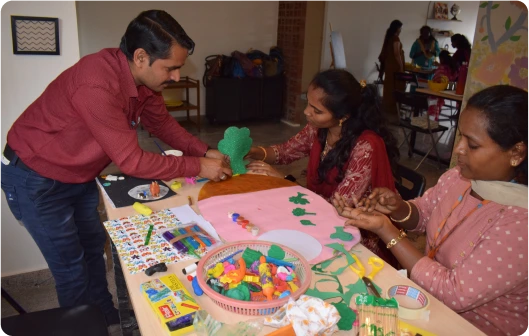
Training sessions are conducted for various groups of educators, including special educators, regular school teachers, and technical training partners. The goal is to make mainstream classrooms more accessible and inclusive for hearing-impaired students, promoting a learning environment where all children can thrive.
VAANI aligns its teacher training initiatives with the National Education Policy (NEP) 2020 goals and the Universal Design of Learning (UDL) approach, ensuring a holistic and standardized framework that accommodates the diverse learning needs of students.
To further expand the reach of these training programs, VAANI uses technology to create online content in different regional languages, allowing teachers to access resources and improve their skills remotely. This effort not only benefits hearing-impaired children but also contributes to fostering inclusive education for other differently-abled children.
VAANI recognizes the crucial role that community workers, including Anganwadi and Asha workers, local NGOs, and health workers, play in supporting hearing-impaired children and their families.
To strengthen this network, VAANI conducts training sessions specifically designed for community workers, focusing on building their capacity to identify and support children with hearing impairments. The modules cover various aspects, such as early detection of hearing loss, understanding communication needs, and creating awareness about deafness within communities.


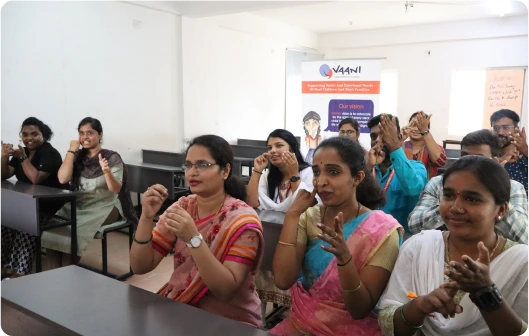

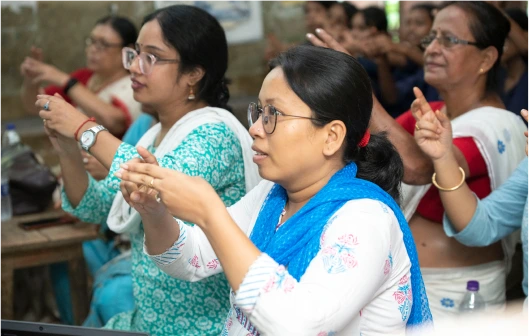
Community workers are trained to serve as resource persons in their local areas, allowing them to provide support and guidance to families in need. The training also includes sensitization programs that raise awareness about the challenges faced by hearing-impaired children and the importance of early intervention.
VAANI collaborates with partners, stakeholders, and local organizations to provide ongoing technical training and resources to community workers, ensuring that they remain well-equipped to meet the needs of hearing-impaired children.
Through these efforts, VAANI aims to develop a local pool of skilled resource persons, thereby ensuring the sustainability and effectiveness of its initiatives in various regions.
VAANI places a strong emphasis on empowering parents through specialized training programs. The goal is to equip parents with the skills and knowledge needed to support their hearing-impaired children in home settings, making them key partners in their child's development.
The training workshops for parents focus on various strategies, including sign language, auditory methods, and lip-reading techniques, to help improve communication with their child. Additionally, parents are taught how to use visual aids and other tools to facilitate learning.


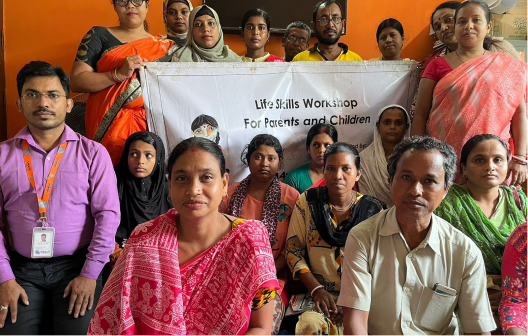

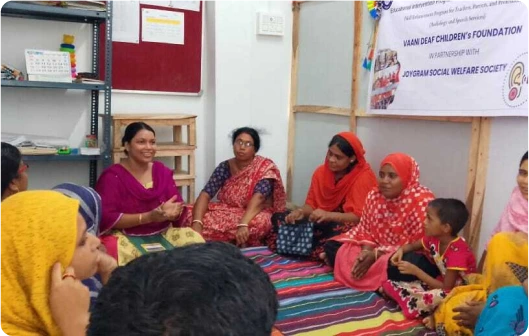
VAANI's parent training programs also include modules on building parenting skills and emotional resilience, ensuring that parents are not only equipped to support their child's education but also prepared to handle the emotional aspects of raising a hearing-impaired child.
These workshops aim to develop parent trainers who can, in turn, support other parents, creating a sustainable model of peer learning and community support.
By involving parents directly in the training process, VAANI ensures that children receive continuous support, both at home and in educational settings. This parent-led approach is crucial for creating a strong support system around hearing-impaired children, enhancing their ability to integrate into mainstream society and reach their full potential.
Help VAANI reach as many deaf children as possible. All donations made to VAANI are 50% exempt from tax under section 80G of the Income Tax Act.